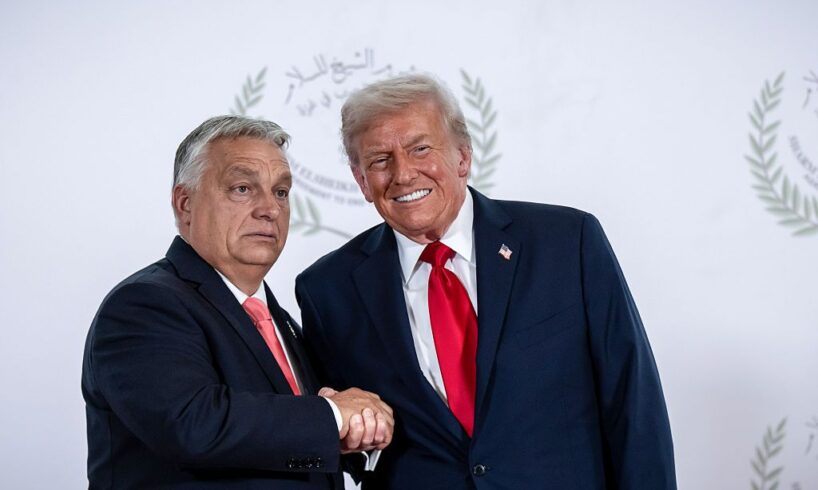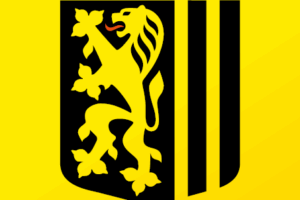
U.S. President Donald Trump (R) takes part in the Gaza summit chaired by Egypt’s President Al-Sisi alongside Vitctor Orban, prime minister of Hungary. (Michael Kappeler/picture alliance via Getty Images)
Hungarian Prime Minister Viktor Orban, entrenched in a long-standing brawl with Brussels and Kyiv, found an unexpected obstacle — U.S. President Donald Trump’s U-turns.
Trump’s expected Budapest summit with Russian President Vladimir Putin — which was to be Orban’s crowning achievement — has been canceled.
Adding insult to the injury, it is Orban who now feels the sting of Trump’s foreign policy zigzags, facing pressure to cut off Russian energy imports and fearing the impact of new U.S. sanctions on Moscow.
Trump’s sanctions against Rosneft and Lukoil, Russia’s leading energy companies, prompted rare criticism from Orban, who said on Oct. 27 that the step went too far.
Hungary’s leader is set to travel to Washington to meet with Trump on Nov. 7 to explore ways to mitigate the impact of sanctions on his country.
As Russian supplies cover most of Hungary’s oil and gas demand, experts say that Orban is likely to stand his ground, especially with the election season heating up.
“Despite mounting pressure from the United States and the European Union, the Orban government appears determined to continue buying energy from Russia,” Richard Demeny, an analyst at the Political Capital think tank in Budapest, told the Kyiv Independent.
Trump says Orban requested exemption from US sanctions on Russian oil but hasn’t been granted one
While most EU member states have largely phased out Russian fossil-fuel imports since 2022, Hungary and Slovakia have continued to receive pipeline deliveries.
Seeking a way out of Trump’s sanctions push
When Trump won the U.S. election last year, Orban was jubilant.
Hungary’s leader hoped the U.S. president — who has endorsed him and shares his conservative, anti-immigration views — would disrupt Western unity on continued support for Ukraine.
However, the latest Trump policy shift does not seem to align with Orban’s expectations.
Washington imposed sanctions on Moscow while urging European nations — including Hungary — to cease importing Russian oil and gas, a strategy designed to force Moscow into peace talks.
This puts Orban into a tight spot, as his government has declared that swift decoupling from Russian imports without endangering its energy security is impossible, namely due to its geographical location.
“We can’t ensure a safe supply for our country without Russian oil or gas sources,” Hungary’s chief diplomat, Peter Szijjarto, said in September. “For us, energy supplies are a purely physical question.”
Russia’s President Vladimir Putin and Hungary’s Prime Minister Viktor Orban arrive to deliver a joint press statement following their talks at the Kremlin in Moscow on July 5, 2024. (Photo by Alexander Nemenov/AFP via Getty Images)
The landlocked Central European country is one of the two remaining EU members — alongside Slovakia — still buying Russian oil via the Druzhba pipeline.
Unlike much of the EU, Budapest made no steps to reduce its reliance on Russian imports.
Quite the contrary, it increased the dependence on Russian crude from 64% before the full-scale invasion to 86% in 2024, the Center for Research on Energy and Clean Air (CREA) reported.
Hungary also signed a 15-year deal with Russia’s Gazprom in 2021 to purchase natural gas mainly via the TurkStream pipeline, seeking increased volumes as the war rages on in Ukraine.
“Orban desperately tries to maintain ties with Russia, repeatedly declaring he would be the first one to return to Moscow,” said Pavel Havlicek, a research fellow at the Association for International Affairs in Prague, underscoring Budapest’s political — rather than just economic — motivations.
Experts say that shifting to alternative supplies — such as oil via Croatia and liquified natural gas via Poland — is fully feasible.
Though options exist, “it’s also the question of political willingness and the financial cost of this choice,” says Andrej Nosko, an energy policy expert and visiting researcher at Matej Bel University in Slovakia.
A comparable example is Czechia, another landlocked country that used the Druzhba pipeline until declaring itself free of Russian oil this April.
Orban, in turn, has shown no inclination toward abandoning Russian energy, which has driven massive profits for Hungary’s MOL oil and gas company.
Cheap utilities could also offer valuable political leverage ahead of the upcoming elections. However, as Nosko notes, MOL’s profits have not translated into lower fuel prices for Hungarian consumers.
While Trump could use the threat of secondary sanctions to pressure Orban, it seems Hungary is instead seeking “waivers from new U.S. sanctions and leveraging its strong ties with Trump to avoid having to diversify away from Russian supplies,” Nosko told the Kyiv Independent.
According to Demeny, Orban might also use a new plan from Hungary’s Energy Ministry, which suggests reducing dependence on Russian energy, to show at least some progress toward diversification and thus appease Trump.
The summit that wasn’t
When Trump unexpectedly announced on Oct. 16 a summit with Putin in Budapest in the coming weeks, Orban was quick to welcome the initiative.
But the hastily announced plan was scrapped mere days later, reportedly after Washington realized Moscow was not ready to concede on its maximalist demands on Ukraine.
In spite of this, Hungary’s foreign minister promptly flew to meet his U.S. and Russian counterparts to assure the public that the summit is still very much on — only the date is yet to be set.
Hosting the summit — the second meeting between Trump and Putin since the former returned to office — would allow Orban to portray himself as a peacemaker, experts say.
It would bolster Orban’s “position on the international stage and against his rising domestic challenger, the Tisza Party’s Peter Magyar,” Demeny noted.
According to Pavlicek, the Hungarian prime minister also seeks to legitimize his foreign policy stance by having other world leaders, namely Trump, share and amplify these views.
Orban’s image as a leader who kept his country out of the war while ensuring energy security through “pragmatic” ties with Moscow has been a prominent feature of the Fidesz campaign.
The Hungarian strongman needs every advantage for the April 2026 vote, which presents the most serious challenge to his rule in years.
The past Putin can’t let go
Putin has long been using perceived historical grievances to attack adversaries and justify political goals. Yet, historians say his focus on Ukraine reaches the level of obsession.
Note from the author:
Hi, this is Martin Fornusek.
I hope you enjoyed this article. In our team, we believe fact-based and truthful reporting should be available to all — that’s why we don’t use any paywall.
If you’d like to help us provide you with more in-depth coverage of Ukraine’s struggle against Russian aggression, European politics, and other topics, please consider joining the Kyiv Independent community.





